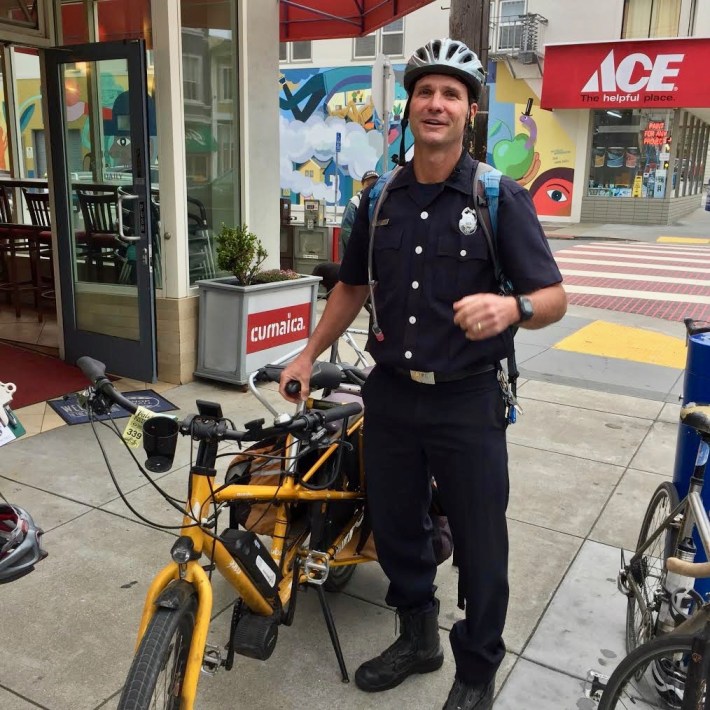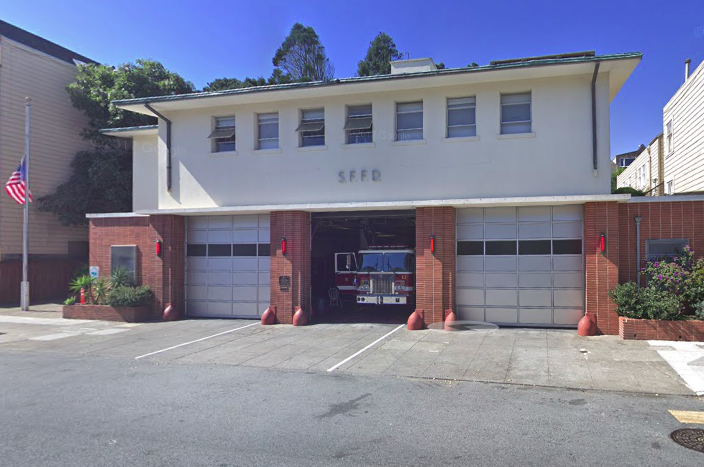Michael Crehan has been a firefighter in San Francisco for five and a half years. He's based at Haight-Ashbury Station Number 12. And unlike most firefighters, he lives in the city and bikes to work. He is also a long-time member of the San Francisco Bicycle Coalition.
Streetsblog first connected with Crehan after he tweeted about Vision Zero and efforts to make streets safer. He can't speak for the department, but strictly as a bike rider who "happens to also be a firefighter." He has some strong views on Vision Zero, response times, and the windshield perspective of many in the department.
Streetsblog spoke with Crehan about these issues and more.
***
Streetsblog: Okay, so just to be clear, you're a firefighter, but you can't speak for the department.
Michael Crehan: Everything I’m going to say is just my opinion.
SB: Got it. That said, I understand the department is forming a Vision Zero committee?
MC: Yup. I Just got appointed to the Vision Zero committee yesterday.
SB: And that's a newly formed committee. What interests you about Vision Zero?
MC: I don't own a car. As far as I know, I'm one of the only members in the fire department who doesn’t own a car. I have two daughters, ages eight and eleven. They go to Grattan Elementary School in the Haight. I live in the Richmond District, so I bike them to school or they ride their own bikes, now that they’re getting older. The bike is our primary mode of transportation.
SB: And you ride the park and the Panhandle. How have things changed for you?
MC: Back in the day, I was one of the first people to ride a cargo bike and now, man, I’m like--I can’t believe it!
SB: There are lots of them out there now?
MC: When I used to pull up to my kids' preschool, very few parents had bikes. Now there are eight to ten cargo bikes and a lot of kids riding their own bikes.
SB: So you ride a cargo-style family bike.
MC: My first bike I got from Portland; a Metrofiet. It's like a mountain bike and you can ride it on trails. We ride in the park a lot. I originally got mine to carry a surfboard, and then outfitted it with kid seats.
SB: Naturally, that dictates your perspective on the city and its streets.
MC: I see the city from the point of view of someone on a bicycle or on foot or on Muni. I might be at work and my daughters are riding their bikes home--my older daughter bikes around herself--so I’m really vested in the safest streets possible.
SB: And that's not usually the case with your fellow firefighters, I take it?
MC: Go to a fire station and it looks like a monster truck rally (laughs). They’re driving enormous cars.
SB: You mean for their personal vehicles?
MC: Yeah, not everybody, but outside the station you’re going to see cars and trucks bigger than my apartment.
SB: So most firefighters are commuting?
MC: A majority doesn’t live in the city. A lot drive from out of town in big cars and trucks and they see the city from the perspective of someone behind the wheel. Some ride bikes, some take Muni or BART, but the vast majority arrive by car. Some firefighters think I’m crazy for letting my kids ride bikes in the city. They even think I'm crazy for riding a bike in the city.
SB: So firefighters don't like cycling?
MC: No, there are many firefighters who bike, but there's also some who think bicycles have no place on city streets. I've heard them say that. They say bikes should only be allowed in Golden Gate Park.
SB: Ugh.
MC: What I could tell you is the perspective of most of the people in the department--well, I can’t really say most--but a lot of the vocal criticism of bike lanes and bulb-outs comes from a group of people who drive huge trucks and don’t live in the city--it's not their kids in the bike lanes or their parents in those crosswalks. They don’t have any real skin in the game of street safety, so they don’t see the benefits.
SB: So all these objections to bike lanes, bulb-outs and other street safety treatments stem from that? So Vision Zero treatments don't impact response times?
MC: I can't speak for the fire marshal or the brass, but to me it's a red-herring.
SB: You drive a ladder truck. You should know. Do bulb-outs and bike lanes slow you down?
MC: In my experience, they’re not in any way slowing us down. In fact, bike lanes speed us up, because it makes space for cars to get out of the way. The perception is that because they’re taking lanes they’re slowing us down, but it’s in no way doing that from my perspective, from the perspective of someone who drives a truck.
SB: But we hear it all the time--"what happens if a house is on fire?!?"
MC: There's an element in this town that wants to use the “oh what if your house is on fire!” excuse against Vision Zero projects. But none of these things are slowing us down. Again, I can’t comment on the fire marshal and the brass downtown, but 99 percent of the member opposition I hear is: "it’s a war on cars!" and "they’re trying to force people not to drive!" I sit across the table from these people and say: “You’re entitled to your opinion, but what does that have to do with emergency response times? Vision Zero is trying to make it safer for people who walk, bike, and drive and you’re telling me you're offended in your personal vehicle?"
SB: What about Muni wires, or the fear of a bike lane interfering with ladder truck access to a building? This came up on Turk and Upper Market, and a few other places.
MC: That might come down to a specific instance on one San Francisco block. So take Upper Market. You close Market, bring the trucks down, put the outriggers out and see if it actually fits.
SB: Not at rush hour, presumably. So you just try it out and see if it fits with the Muni wires and the dimensions of the parking-protected bike lane. You see if you can still get a ladder to the roof of a building?
MC: You go out there with a tape measure. But if the issue is really about Muni wires, where’s the conversation about under-grounding utility wires?
SB: Right. There are utility wires all over the place that can interfere with ladder access, so why are they only picking on wires on streets with bike lanes?
MC: There are streets in the Haight, my response area, where aerial ladders are not an option for fifty percent of the streets because of utility poles, so we use wooden ground ladders.
SB: Wooden?
MC: Because they don’t conduct electricity. There are also tons of streets we can’t drive our trucks down. Graystone Terrace, Upper Terrace--
SB: Because they're too narrow?
MC: They’re too narrow because of parking--if there’s an Escalade or a Range Rover parked on the street, we can't get down it. We have streets we cannot get down because of street parking. There are streets like this in North Beach, Bernal Heights--so if it’s really an issue of access and response time, we’d be removing the parking from those streets, but it’s so politically unpopular you can’t do it. So is this about political expediency or street safety?
SB: I guess we know the answer to that. So how do we get rank-and-file firefighters to start experiencing the streets differently?
MC: A lot of fire stations provide parking. I show up to Station 12 in the Haight, and then I'll get detailed to downtown, and when I started they said “Dude, get a car! What if you get detailed?” But I have a bike with an electric motor. I go from the Haight to downtown in twenty minutes, at eight in the morning. In a car it takes you an hour.
SB: What about your gear?
MC: We have about 70 pounds of gear, so I throw it in the back of my cargo bike. But bottom line is I get to 90 percent of my details quicker than the people who drive.
SB: Don't others see your bike and start to figure this out?
MC: We had a new member show up yesterday to our firehouse. She’s right out of the academy and she told me she doesn’t own a car. She asked me, "Do I have to get a car?” and I said, "No, there's nothing in the rules that says you have to get a car, and with Uber or Lyft, don’t let anybody tell you to get a car." I was told to get a car, and I never did. At my firehouse there are now four or five people who bike to work. But when I started there was nobody.
SB: Thanks Michael. And thanks for working to keep us safe--both on and off the job.
MC: Thank you.
This interview was edited.







